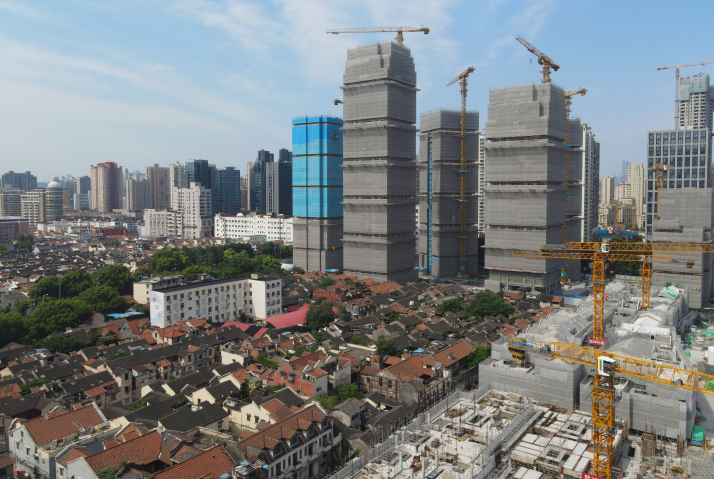In the past, overseas individuals living or working in China for over a year interested in purchasing property in the Chinese mainland faced a massive hurdle: Before they could convert foreign currency into Chinese yuan (RMB) and make the down payment, they first had to obtain a property registration certificate. However, developers and property owners usually insisted on receiving the down payment before the certificate could be officially registered, in turn creating a frustrating “chicken and egg” situation for overseas buyers.
A September notice issued by the State Administration of Foreign Exchange (SAFE) announced that the policies on facilitating overseas individuals’ property purchasing payment will expand from the Guangdong-Hong Kong-Macao Greater Bay Area (GBA) in south China to the rest of the country.
This move will eliminate the payment dilemma that has plagued overseas homebuyers for over a decade. Under the new policy, as soon as a purchase contract is signed, overseas individuals can directly go to a bank to convert their foreign currency into RMB and make their down payment. They can submit the property registration certificate afterward.
SAFE Deputy Administrator and spokesperson Li Bin said at a press conference in Beijing in September that this reform aims to meet the legitimate housing needs of more overseas individuals who work and live in the Chinese mainland, while also promoting regional integration—as well as the flow of talent.
He said China’s real estate market has undergone major changes in recent years. As part of broader governmental efforts to optimize and stabilize the sector, adjusting the rules on the use of foreign exchange (forex) for home purchases is necessary to ensure they align with the new economic realities, helping to maintain a stable and sustainable real estate market in the long term.

Breaking ground
In 2024, the Guangdong Branch of the People’s Bank of China, the country’s central bank, together with the SAFE’s Guangdong Branch, introduced a guideline on facilitating settlement and payment for residents of Hong Kong and Macao special administrative regions purchasing property in mainland GBA cities. This was a decisive step forward, implementing a “pay first, submit related materials later” process.
The guideline made great strides in facilitating property purchases for Hong Kong and Macao residents in the GBA, Li Yujia, chief researcher at the Guangdong Housing Policy Research Center, told China Newsweek magazine in September.
The relaxation of home-buying restrictions, along with the introduction of more facilitation measures, has been considered a key factor in unlocking the potential of Hong Kong and Macao residents to invest in mainland real estate within the GBA. For example, buyers from Hong Kong accounted for nearly 70 percent of homes sold in the Junluan housing project in Panyu District, Guangdong Province, developed by Hong Kong property developer Sun Hung Kai Properties, in 2024.
Li Bin emphasized that overseas individuals must meet local housing qualifications in order to benefit from the reform. In other words, the recent adjustments do not necessarily change the overall policy regarding overseas property buyers in the Chinese mainland.
Since 2006, when a regulation on foreign investment access and management in the real estate market was issued, overseas individuals who have worked or studied in China for over a year have been permitted to purchase housing for personal use. However, they have been prohibited from buying properties for investment or other non-residential purposes.
In 2010, policies were further tightened. Overseas individuals (excluding residents of Hong Kong, Macao and China’s Taiwan region, as well as overseas Chinese) were restricted to purchasing only one residential property for their own use. Additionally, foreign institutions with branches or representative offices in the Chinese mainland were allowed to purchase non-residential real estate, but only in the cities where they were registered and specifically for office use.
The new policy in September also lifts the ban on capital-account forex income and its RMB proceeds, including capital and foreign debts of non-real estate enterprises, for purchasing non-self-use residential properties.
Li Bin said the restriction was made previously in response to the real estate market overheating, with several government departments introducing measures to regulate real estate enterprises and the sector at large. From the perspective of preventing speculative “hot money” from entering the market, the SAFE introduced measures such as barring the use of the capital and foreign debt of non-real estate enterprises for the construction or purchase of non-self-use residential property. These measures had played a positive role in promoting the phased, stable and healthy development of the real estate market.
According to real estate information provider Anjuke, the recent reform means that foreign-invested enterprises will have more flexibility in managing their commercial real estate assets, potentially helping to revitalize the mainland’s market.
Following the market
Li Yujia also mentioned that China’s earlier restrictions on overseas funds purchasing property were largely meant to curb speculative inflows. In the past, authorities were wary of foreign capital driving up housing prices. In recent years, however, as global trade dynamics and geopolitical dynamics have shifted, forex inflows under both the current and capital accounts have slowed, prompting the need to adjust the review rules for forex income and its RMB settlement proceeds used for domestic investment and consumption.
He said that with the property market entering an era of oversupply and weaker liquidity, concerns about speculative “hot money” have become far less pressing.
China has been expanding visa-free access for international visitors and entrepreneurs in recent years. Tourists from 76 countries are now able to benefit from unilateral or mutual visa-free entry, while citizens of 55 countries can visit China in transit visa-free for up to 10 days, before traveling on to a third destination.
As the country becomes more open, more foreigners are coming to China to travel, spend and do business—and some naturally wish to buy homes here. That requires more flexible rules for forex settlement, property purchases and local consumption, he added.
Analysts view the new policy as a calibrated move to tap overseas demand without overheating the market, something existing buyer restrictions will continue to guard against. More importantly, they interpret the shift as a strategic signal of China’s intent to facilitate foreign capital inflows and encourage reasonable participation in the property market, aligning with its wider goals of further economic opening up.
Huang Lichong, CEO of investment company Huisheng International Capital, anticipated that the new rule will have a modest yet meaningful impact. He told news portal ThePaper.cn that it may lead to some potential buyers finalizing their purchases, particularly in large cities, as well as cities close to the GBA. According to Huang, the policy might reduce the down payment processing time from several weeks to just a few days.
However, Huang did emphasize that factors including the self-use mandate, local property-buying rules and current credit policies will remain unchanged. He pointed out that this will not result in a flood of foreign capital coming in but rather in a gradual and steady flow.
With the new policy already simplifying the process for foreign residents to buy homes in the Chinese mainland, Li Yujia believes that the reform results will depend on how local governments adjust their own restrictions. “Whether cities relax limits on the number of homes overseas individuals can buy will determine how far these reforms can go,” he said. –The Daily Mail-Beijing Review news exchange item






